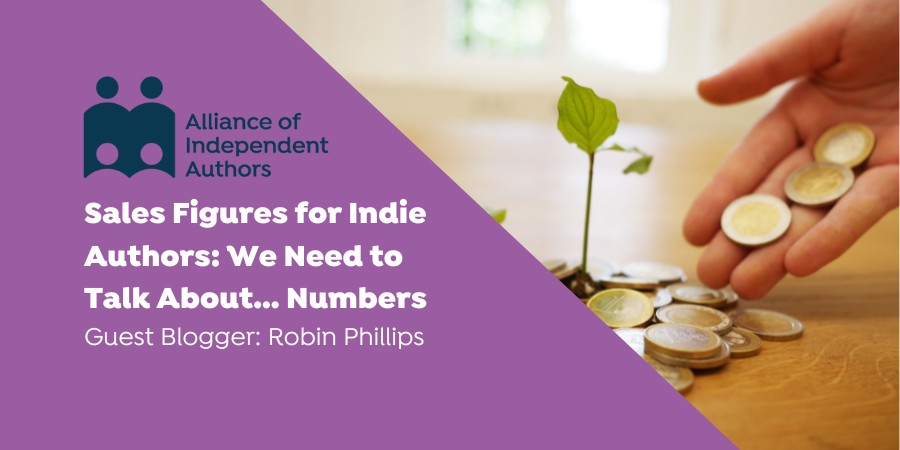
Robin Phillips
If you've ever wondered what sales figures for indie authors really mean, and which numbers are important when self-publishing, read on…
This month's opinion piece has been contributed by Alliance of Independent Authors (ALLi) member, Robin Phillips.
Robin has been self-publishing under the pen name Russell Phillips since 2011. Robin used that experience to start Author Help, an author services business, in 2018. You can find Robin on Mastodon.
“Turnover is vanity, profit is sanity”
Many years ago, I went on a short business course. While talking about money, an instructor said something that has stuck with me ever since: “Turnover is vanity, profit is sanity”. The meaning is straightforward. A high turnover, being the money coming into the business, can make the owner feel good. But profit, the money that remains after any expenses have been paid, is what really matters.
The phrase illustrates that it's important to focus on the right numbers. If you sell twice as many books, but spend so much on advertising that your profit doesn't increase, you're no better off. If you spent more time on marketing and setting up adverts in order to get that doubling in sales, you're actually worse off, since you've worked harder to earn the same amount of money.
Rank vs. income
The Wide for the Win group has a related saying: “Bank over rank”. Having a good rank on Amazon is nice, and it can make you feel good, but that high ranking won't pay the bills. A high ranking does mean that you're selling more copies than someone with a lower ranking, but only on Amazon.
You might think your book is making more money than a book with a lower ranking. But if the other book has a higher price or if it is selling well elsewhere, it might actually be making more money overall.
Fundamentally, the total income is the important number. The book's ranking on Amazon may be related to that, but it's not important in and of itself. If you happen to sell better elsewhere than on Amazon, your rank won't reflect your income.
Focus on the income, because that is the important number.
Looking deeper at sales figures for indie books
Numbers alone often don't tell the whole story. What's behind the numbers can be very important.
We all know that there are millions of books for sale at Amazon, and amazon.com has billions of monthly visitors. Wargame Vault, by contrast, has about 25,000 titles for sale and 242,000 monthly visitors. It's tiny compared to Amazon, and I suspect most people reading this have never heard of it before. Yet, Wargame Vault regularly makes up about a quarter of my book income. For me, it outperforms better known vendors such as Kobo, Apple, B&N, and Google, despite being much smaller than all of them.
The reason is clear if you look a little deeper. I write military history, and Wargame Vault, as its name suggests, is targeted at wargamers, many of whom have an interest in military history. Most of the people visiting Amazon, on the other hand, even those looking for books, will have no interest in what I write about. A much higher proportion of people on Wargame Vault are looking for the type of book that I write, hence my disproportionate sales.
 What's important for self-published authors on social media?
What's important for self-published authors on social media?
So what about social media? Surely the numbers matter there. After all, if you want a traditional publishing deal, any agent or publisher will want to know how many followers you have. But the reality is that they don't care about followers, they care about reach. Followers are just an easy, albeit crude and unreliable, way of measuring that.
Since about 2015, Facebook has shown posts to a tiny proportion of followers, based on a secret algorithm. Most social media has similar algorithms that determine who a post is shown to. Mastodon, on the other hand, simply shows posts in chronological order.
This can have a big impact. When I was on Twitter, most of my posts got no interaction at all. Mastodon is much smaller than Twitter, and I only have about two-thirds as many followers on Mastodon as I had on Twitter. Yet, my posts on Mastodon get a lot more traction. A recent post about a subject related to my books got around 200 boosts (equivalent to retweets on Twitter) and 230 favourites (equivalent to likes). An older post got almost 2,000 boosts and over 650 likes. On Twitter, I never got more than a dozen or so retweets or likes, presumably because most of my followers didn't see my tweets.
Who the people are is also important. This is why Wargame Vault does well for me, and sites like Radish do well for romance authors. Twitter has always had a lot of media coverage, even before Elon Musk's highly public takeover. Twitter has always been tiny compared to Facebook, having only about a fifth of the users. But Twitter was popular among journalists, and so it got a lot of media coverage.
Ebook growth – fact or fiction?
One area where numbers can be very misleading is when discussing growth. In the early years of the ebook boom, ebooks had huge growth figures, much larger than paper books, leading some to speculate that ebooks were the future and print books on the verge of becoming obsolete. The numbers looked very impressive, but when looking at growth, it's important to consider the starting point. If I sell one ebook in one year, and ten ebooks in the following year, that's 900% growth, but I still only sold ten ebooks in the second year.
To use a real-world example, the American Association of Publishers (AAP) reported that traditional publisher ebook sales grew by 165% in 2010, then by 117% in 2011. It was these growth numbers that led some to think that print was dying. Yet even after two years of triple-digit ebook growth, 84% of sales were print books. Ebook sales were tiny in 2009, so even when sales more than doubled, they were still small compared to print sales.
Conclusion
Don't dismiss a marketing or selling opportunity just because the raw numbers look small. Equally, don't be dazzled by big numbers, and remember that growth means nothing on its own.
Numbers are important, but make sure you're looking at the right numbers.
And look beyond the numbers, too, because numbers alone don't tell the whole story.

Photo by Myriam Jessier on Unsplash
Find out more
Take a look at the facts and figures about indie author incomes with ALLi's indie author survey results 2023.
And if you are looking to brush up your business planning, take a look at this post from ALLi Director, Orna Ross, looking at the different business models indie authors can take to make a profit: Business Models for Authors.


 What's important for self-published authors on social media?
What's important for self-published authors on social media?

